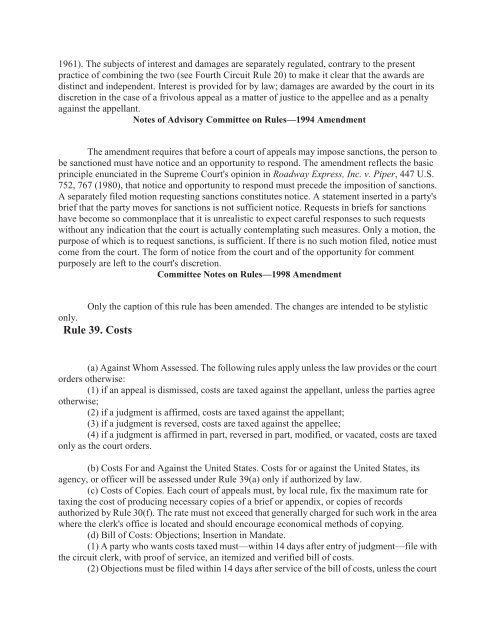Federal Rules of Appellate Procedure 2014-2015, 2014a
Federal Rules of Appellate Procedure 2014-2015, 2014a
Federal Rules of Appellate Procedure 2014-2015, 2014a
Create successful ePaper yourself
Turn your PDF publications into a flip-book with our unique Google optimized e-Paper software.
1961). The subjects <strong>of</strong> interest and damages are separately regulated, contrary to the present<br />
practice <strong>of</strong> combining the two (see Fourth Circuit Rule 20) to make it clear that the awards are<br />
distinct and independent. Interest is provided for by law; damages are awarded by the court in its<br />
discretion in the case <strong>of</strong> a frivolous appeal as a matter <strong>of</strong> justice to the appellee and as a penalty<br />
against the appellant.<br />
Notes <strong>of</strong> Advisory Committee on <strong>Rules</strong>—1994 Amendment<br />
The amendment requires that before a court <strong>of</strong> appeals may impose sanctions, the person to<br />
be sanctioned must have notice and an opportunity to respond. The amendment reflects the basic<br />
principle enunciated in the Supreme Court's opinion in Roadway Express, Inc. v. Piper, 447 U.S.<br />
752, 767 (1980), that notice and opportunity to respond must precede the imposition <strong>of</strong> sanctions.<br />
A separately filed motion requesting sanctions constitutes notice. A statement inserted in a party's<br />
brief that the party moves for sanctions is not sufficient notice. Requests in briefs for sanctions<br />
have become so commonplace that it is unrealistic to expect careful responses to such requests<br />
without any indication that the court is actually contemplating such measures. Only a motion, the<br />
purpose <strong>of</strong> which is to request sanctions, is sufficient. If there is no such motion filed, notice must<br />
come from the court. The form <strong>of</strong> notice from the court and <strong>of</strong> the opportunity for comment<br />
purposely are left to the court's discretion.<br />
Committee Notes on <strong>Rules</strong>—1998 Amendment<br />
Only the caption <strong>of</strong> this rule has been amended. The changes are intended to be stylistic<br />
only.<br />
Rule 39. Costs<br />
(a) Against Whom Assessed. The following rules apply unless the law provides or the court<br />
orders otherwise:<br />
(1) if an appeal is dismissed, costs are taxed against the appellant, unless the parties agree<br />
otherwise;<br />
(2) if a judgment is affirmed, costs are taxed against the appellant;<br />
(3) if a judgment is reversed, costs are taxed against the appellee;<br />
(4) if a judgment is affirmed in part, reversed in part, modified, or vacated, costs are taxed<br />
only as the court orders.<br />
(b) Costs For and Against the United States. Costs for or against the United States, its<br />
agency, or <strong>of</strong>ficer will be assessed under Rule 39(a) only if authorized by law.<br />
(c) Costs <strong>of</strong> Copies. Each court <strong>of</strong> appeals must, by local rule, fix the maximum rate for<br />
taxing the cost <strong>of</strong> producing necessary copies <strong>of</strong> a brief or appendix, or copies <strong>of</strong> records<br />
authorized by Rule 30(f). The rate must not exceed that generally charged for such work in the area<br />
where the clerk's <strong>of</strong>fice is located and should encourage economical methods <strong>of</strong> copying.<br />
(d) Bill <strong>of</strong> Costs: Objections; Insertion in Mandate.<br />
(1) A party who wants costs taxed must—within 14 days after entry <strong>of</strong> judgment—file with<br />
the circuit clerk, with pro<strong>of</strong> <strong>of</strong> service, an itemized and verified bill <strong>of</strong> costs.<br />
(2) Objections must be filed within 14 days after service <strong>of</strong> the bill <strong>of</strong> costs, unless the court


















